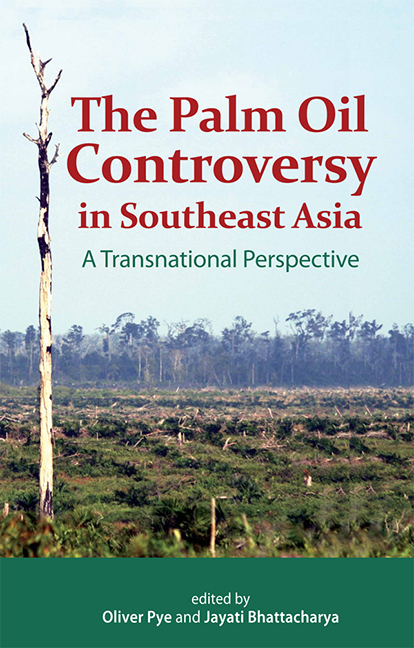Book contents
- Frontmatter
- Contents
- Foreword
- Preface
- Contributors
- Abbreviations
- 1 Introduction
- 2 Malaysian Corporations as Strategic Players in Southeast Asia's Palm Oil Industry
- 3 The Political Ecology of the Indonesian Palm Oil Industry
- 4 Evolutionary Change in the Oil Palm Plantation Sector in Riau province, Sumatra
- 5 Contradictions of Palm Oil Promotion in the Philippines
- 6 The Political Economy of Migration and Flexible Labour Regimes: The Case of the Oil Palm Industry in Malaysia
- 7 Migration and Moral Panic: The Case of Oil Palm in Sabah, East Malaysia
- 8 Reconciling Development, Conservation, and Social Justice in West Kalimantan
- 9 An Analysis of Transnational Environmental Campaigning around Palm Oil
- 10 EU Biofuel Policies and their Implications for Southeast Asia
- 11 Leveraging Product and Capital Flows to Promote Sustainability in the Palm Oil Industry
- 12 Free, Prior, and Informed Consent? Indigenous Peoples and the Palm Oil Boom in Indonesia
- Index
- Plate section
8 - Reconciling Development, Conservation, and Social Justice in West Kalimantan
Published online by Cambridge University Press: 21 October 2015
- Frontmatter
- Contents
- Foreword
- Preface
- Contributors
- Abbreviations
- 1 Introduction
- 2 Malaysian Corporations as Strategic Players in Southeast Asia's Palm Oil Industry
- 3 The Political Ecology of the Indonesian Palm Oil Industry
- 4 Evolutionary Change in the Oil Palm Plantation Sector in Riau province, Sumatra
- 5 Contradictions of Palm Oil Promotion in the Philippines
- 6 The Political Economy of Migration and Flexible Labour Regimes: The Case of the Oil Palm Industry in Malaysia
- 7 Migration and Moral Panic: The Case of Oil Palm in Sabah, East Malaysia
- 8 Reconciling Development, Conservation, and Social Justice in West Kalimantan
- 9 An Analysis of Transnational Environmental Campaigning around Palm Oil
- 10 EU Biofuel Policies and their Implications for Southeast Asia
- 11 Leveraging Product and Capital Flows to Promote Sustainability in the Palm Oil Industry
- 12 Free, Prior, and Informed Consent? Indigenous Peoples and the Palm Oil Boom in Indonesia
- Index
- Plate section
Summary
Indonesia has recently become the biggest producer of palm oil in the world, with over six million hectares of oil palm plantations that can produce over 17 million tonnes of crude palm oil (CPO). In 2007 the total export earnings from CPO and its by-products were worth US$7.8 billion. The strategic role of the palm oil sector for the national economy is matched by its ability to absorb manpower in a big way. It has been estimated that over three million people now work in the palm oil sector and for this reason palm oil is seen as a successful means of developing rural areas. Palm oil development is seen as killing three birds with one stone, by creating job opportunities, enhancing community welfare, and by acquiring valuable foreign exchange.
The demand for palm oil on the global market has encouraged the Indonesian Government to stimulate the expansion of oil palm plantations. Many facilities and incentives have been given to private investors to invest in this sector, whilst policies that protect local communities and the environment are lacking (see Jiwan, this volume). This creates a dilemma of environmental and community concerns against the dominant form of development.
In May 2005 the President of Indonesia, Susilo Bambang Yudhoyono, announced plans to develop a 5–10 kilometre belt along the Indonesia- Malaysia border on Borneo with palm oil plantations. This “Kalimantan Border Oil Palm Mega Project” aimed to convert an area of 1.8 million hectares, including parts of three national parks which straddled mountain ridges in the centre of Borneo (Potter 2009, p. 98). As such, the project stood in direct contradiction to another “mega-project”, the “Heart of Borneo” conservation project initiated by the WWF, which aimed to create a transnational conservation area linking and expanding national parks in Indonesia, Malaysia, and Brunei.
The ensuing controversy around both projects represents the dichotomy between “development” and “conservation” in its purest form. On the one hand, the Indonesian Government, particularly the Ministry of Agriculture, sees the expansion of palm oil as a way to increase foreign investment and export revenue, and as a way to improve the living conditions of people living in marginalized areas along the border.
- Type
- Chapter
- Information
- The Palm Oil Controversy in Southeast AsiaA Transnational Perspective, pp. 164 - 178Publisher: ISEAS–Yusof Ishak InstitutePrint publication year: 2012



